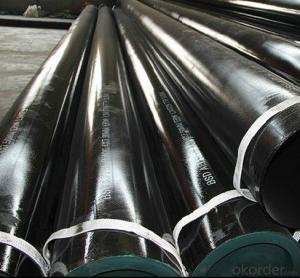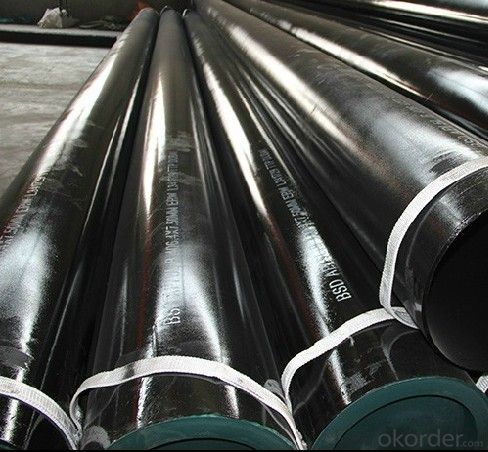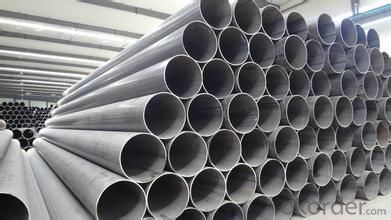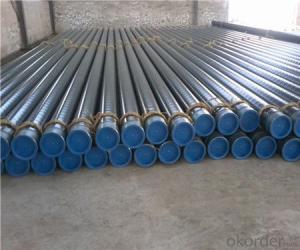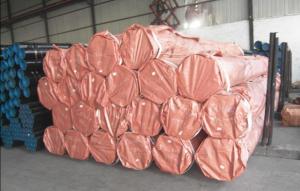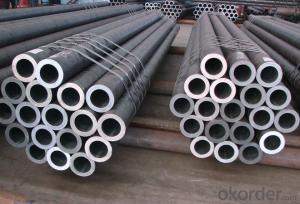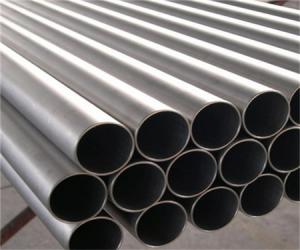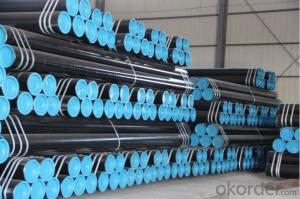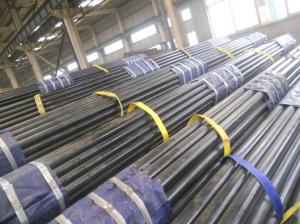ASTM A53 API 5L Straight Seam Steel Pipe
- Loading Port:
- China Main Port
- Payment Terms:
- TT or LC
- Min Order Qty:
- -
- Supply Capability:
- -
OKorder Service Pledge
OKorder Financial Service
You Might Also Like
Quick Details
| Thickness: | 1 - 73 mm | Section Shape: | Round | Outer Diameter: | 6 - 830 mm |
| Place of Origin: | China (Mainland) | Secondary Or Not: | Non-secondary | Application: | Fluid Pipe,chemical,construction,structure,fluid,bioler,drill,hydraulic,gas,oil, |
| Technique: | Cold Rolled | Certification: | CE | Surface Treatment: | Galvanized |
| Special Pipe: | Thick Wall Pipe | Alloy Or Not: | Non-alloy | color: | carbon black |
| packing: | in bundles | lenght: | 6m--12m | ends: | plain or bevel |
| surface: | oiled or black | Coating: | 3PE,FBE or as per your request. | head code: | round |
| Material: | CS/SS/AS | Grade: | 20#,16Mn,API J55,10#-45#,API J55-API P110 | Standard: | ASTM A106-2006,ASTM A53M-2007,API 5L,ASTM,API |
Packaging & Delivery
| Packaging Detail: | 6 steel strip,bundles,Caps , plastic wrap,loading belt or according to your request. |
| Delivery Detail: | Within 30 days after confirmed the order |
Specifications
1.API 5L/ASTM A53 ERW/straight seam steel pipe.
2.standard:ASTM,ANSI,JIS,EN,BS,GOST.
3.API&ISO9001 certification.
API 5L/ASTM A53 ERW/Straight Seam Steel Pipe Image
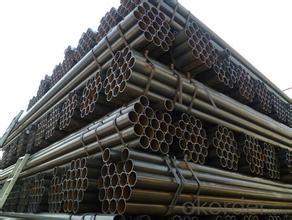
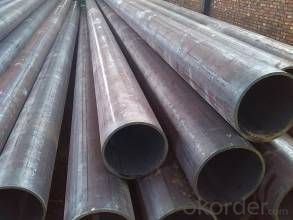
FAQ of Seamless Pipe
①How is the quality of your products?
Our products are manufactured strictly according to national and internaional standard, and we take a test
on every pipe before delivered out. If you want see our quality certifications and all kinds of testing report, please just ask us for it.
Guaranteed: If products’ quality don’t accord to discription as we give or the promise before you place order, we promise 100% refund.
②How about price?
Yes, we are factory and be able to give you lowest price below market one, and we have a policy that “ for saving time and absolutely honest business attitude, we quote as lowest as possible for any customer, and discount can be given according to quantity”,if you like bargain and factory price is not low enough as you think, just don’t waste your time.Please trust the quotation we would give you, it is professional one.
③Why should you chose us?
Chose happens because of quality, then price, We can give you both.Additionally, we can also offer professional products inquiry, products knowledge train(for agents), smooth goods delivery, exellent customer solution proposals.Our service formula: good quality+good price+good service=customer’s trust
SGS test is available, customer inspection before shipping is welcome, third party inspection is no problem.
Any question, pls feel free to contact us !
- Q: What are the different methods of coating steel pipes?
- There are several methods of coating steel pipes, including fusion bonded epoxy (FBE) coating, liquid epoxy coating, polyethylene (PE) coating, and polyurethane (PU) coating. Each method offers unique advantages and is chosen based on factors such as the desired level of corrosion protection, application environment, and project requirements.
- Q: Are steel pipes suitable for industrial cooling systems?
- Yes, steel pipes are suitable for industrial cooling systems. They are highly durable, resistant to corrosion, and can withstand high pressures and temperatures. Additionally, steel pipes have excellent heat transfer properties, making them efficient for cooling applications.
- Q: What is the role of steel pipes in sewage systems?
- Steel pipes play a crucial role in sewage systems as they are used to transport wastewater and sewage from various sources to treatment plants or disposal areas. Their strength, durability, and resistance to corrosion make them ideal for handling the often harsh and corrosive nature of sewage. Additionally, steel pipes can withstand high pressures and provide a reliable and long-lasting solution for sewage transportation, ensuring the efficient and safe functioning of sewage systems.
- Q: How do you prevent corrosion in steel pipes?
- One effective way to prevent corrosion in steel pipes is by applying a protective coating, such as paint or epoxy, to the surface of the pipes. This barrier creates a physical barrier between the pipe and the surrounding environment, preventing moisture and corrosive agents from coming into direct contact with the steel. Additionally, regular inspection and maintenance of the pipes, including cleaning and repairing any damaged coating, can help identify and address potential issues before they lead to corrosion.
- Q: How are steel pipes measured and categorized?
- Steel pipes are typically measured and categorized based on their outer diameter, wall thickness, and length. The outer diameter refers to the measurement of the pipe's cross-sectional width, while the wall thickness refers to the thickness of the pipe's walls. These measurements are usually expressed in millimeters or inches. Categorization of steel pipes is done based on their purpose and specifications. The most common categorization is based on the pipe's pressure rating, which determines its ability to withstand different levels of internal or external pressure. Pipes are classified into various pressure classes, such as Schedule 40, Schedule 80, and Schedule 160, among others. The higher the pressure class, the thicker and stronger the pipe. Another way to categorize steel pipes is based on their manufacturing process and material composition. For example, seamless steel pipes are produced through a process that involves piercing a solid bar of steel to form a hollow tube, while welded steel pipes are made by rolling and welding a flat steel sheet or strip into a cylindrical shape. Additionally, steel pipes can be categorized based on their material composition, such as carbon steel pipes, stainless steel pipes, or alloy steel pipes. Steel pipes are also categorized based on their end connections or fittings. Common types of pipe ends include threaded ends, which are suitable for screwing fittings onto the pipe, and plain ends, which are typically used for welding or flanging connections. Overall, the measurement and categorization of steel pipes play a crucial role in ensuring their proper selection and usage in various industries, such as construction, oil and gas, plumbing, and manufacturing.
- Q: How do steel pipes handle high-velocity flow?
- Steel pipes are able to handle high-velocity flow due to their strong and durable nature. The smooth inner surface of steel pipes allows for efficient and smooth flow of fluids, minimizing frictional losses. Additionally, steel pipes have high tensile strength, enabling them to withstand the pressure exerted by high-velocity flow without deformation or bursting.
- Q: Which is cheaper, angle iron or steel pipe?
- Angle iron and steel pipe, angle iron is cheap.
- Q: Can steel pipes be used in marine environments?
- Yes, steel pipes can be used in marine environments. Steel is a commonly used material in marine structures due to its strength, durability, and resistance to corrosion. However, it is important to use the appropriate grade of steel and apply protective coatings to enhance its resistance to seawater corrosion. Regular maintenance and inspections are also necessary to ensure the longevity and performance of steel pipes in marine environments.
- Q: What are the different types of corrosion that can affect steel pipes?
- There are several types of corrosion that can affect steel pipes, including general or uniform corrosion, pitting corrosion, galvanic corrosion, crevice corrosion, and stress corrosion cracking.
- Q: How are steel pipes insulated to prevent heat loss?
- Steel pipes are typically insulated using materials such as fiberglass, foam, or mineral wool. These insulation materials are wrapped around the pipes and securely held in place with tapes or clamps. This insulation layer acts as a barrier, reducing heat transfer and preventing heat loss from the steel pipes.
Send your message to us
ASTM A53 API 5L Straight Seam Steel Pipe
- Loading Port:
- China Main Port
- Payment Terms:
- TT or LC
- Min Order Qty:
- -
- Supply Capability:
- -
OKorder Service Pledge
OKorder Financial Service
Similar products
Hot products
Hot Searches
Related keywords
